If you have a job interview coming up, you’re guaranteed to hear behavioral interview questions.
Behavioral interview questions assess candidates’ behavior and skills in specific situations. You’ve probably heard them a million times without even knowing: “Describe a situation when…” or “Can you recall a time when…”.
Each question aims to evaluate several skills important for the position you applied for — and the best way to answer and showcase those skills is to use the STAR (Situation–Task–Action–Result) framework.
In this article, you’ll get:
- A list of 40 behavioral interview questions
- Sample answers to the 10 most common behavioral interview questions
- Tips on how to anticipate any behavioral question (and answer them with ease)
- What to do when you’ve never experienced a situation they’re asking about

Don’t waste days compiling overused interview techniques. Get original answers to every single question you could expect.
Full List of Behavioral Interview Questions
Behavioral questions about teamwork and conflict resolution
- Describe a time when you had to handle a conflict at work.
- Can you share an instance where you went over and above to help a team member?
- Tell me about a time when your team achieved a significant goal.
- Share an example of when you had to adapt to a team member’s working style.
- How have you handled a situation where a team member was not pulling their weight?
- Can you give an example of a time when your team disagreed with your decision, and how did you manage it?
- How have you handled personality clashes in your team?
- Talk about a time when you had to motivate a demotivated team member.
Behavioral questions about problem-solving and decision-making
- Describe a situation where you had to make a tough decision with limited information.
- Tell me about a time when you solved a complex problem at work.
- Can you share an instance where your initial solution to a problem didn’t work, and what did you do?
- Give an example of a decision you made that was a failure. What happened and why?
- How did you approach a situation where you had multiple problems to solve at the same time?
- Discuss a situation where you implemented a creative solution to an issue.
- Can you describe a time when you had to choose between two viable solutions?
- Share an instance where you relied on your analytical skills to solve a problem.
Behavioral questions about leadership and management
- Can you describe a situation where you led a project or a team to success?
- Tell me about a time when you needed to get a team to improve its performance.
- Share an experience of leading a team through a major organizational change.
- Discuss a situation when you had to lead under pressure or a tight deadline.
- How have you handled a non-performing team member?
- Can you give an example of a time when you had to address an angry client or customer?
- Describe how you have delegated tasks effectively in a past position.
- Tell me about a time when you mentored or coached someone.
Behavioral questions about communication
- Tell me about a time when you had to simplify complex information for a team or a client.
- How have you persuaded someone to see things your way at work?
- Give an example of how you handle communicating negative news to a team or a client.
- Share an example where you had to give a presentation or a speech.
- Can you share an instance where your communication skills helped avoid or resolve a situation?
- Can you describe a difficult conversation you’ve had at work and its outcomes?
- Describe a time when you effectively used written communication.
- How have you handled communicating with a diverse group of individuals?
Behavioral questions about initiative, ownership, and motivation
- Can you provide an example of when a project or an idea you initiated benefited your team or organization?
- Describe a time when you volunteered to expand your knowledge at work, without being asked.
- Tell me about a time when you worked under close supervision or without supervision.
- Talk about a project or task you started on your own initiative.
- Tell me a situation when you saw some problem and took the initiative to correct it rather than waiting for someone else to do it.
- Can you detail a situation when you had to go above your normal duties to get a job done?
- Share an instance where your self-motivation helped you achieve a professional goal.
- Describe a time when you stayed motivated despite a challenging work situation or environment.
10 Most Common Behavioral Questions with Sample Answers
Describe a time when you had to handle a conflict at work.
Sample answer (All-purpose):
For more tips on how to answer questions about conflict, check out this video:
Tell me about a time when you or your team achieved a significant goal.
Sample answer (Hospital administrator):
Tell me about a time when you solved a complex problem at work.
Sample answer (Accountant):
Give an example of a decision you made that was a failure. What happened and why?
Sample answer (HR):
Discuss a situation when you had to lead under pressure or a tight deadline.
Sample answer (Graphic design):
Here are some more behavioral questions about leadership you might hear:
Can you give an example of a time when you had to address an angry client or customer?
Sample answer (Retail):
Find more customer service questions here:
Can you describe a difficult conversation you’ve had at work and its outcomes?
Sample answer (Marketing):
Tell me about a time when you had to simplify complex information for a team or a client.
Sample answer (Sales):
Can you provide an example of when a project or an idea you initiated benefited your team or organization?
Sample answer (Executive Assistant):
Describe a time when you stayed motivated despite a challenging work situation or environment.
Sample answer (Graphic design)
How to Answer Behavioral Interview Questions: Tips and Tricks
Anticipate behavioral questions
There are a lot of different behavioral questions. Preparing for every single one is not possible — but there’s a way to narrow down and anticipate which behavioral questions you’ll hear.
The key is in the job description.
Study the job description and think about the role in order to predict the type of interview questions you might hear.
What skills would a person need to have to be successful in this role? How would their working day look? Which roles and departments would they work with?
Let’s take a look at this Customer Representative job ad. Underlined in red are some key skills and responsibilities of the role.
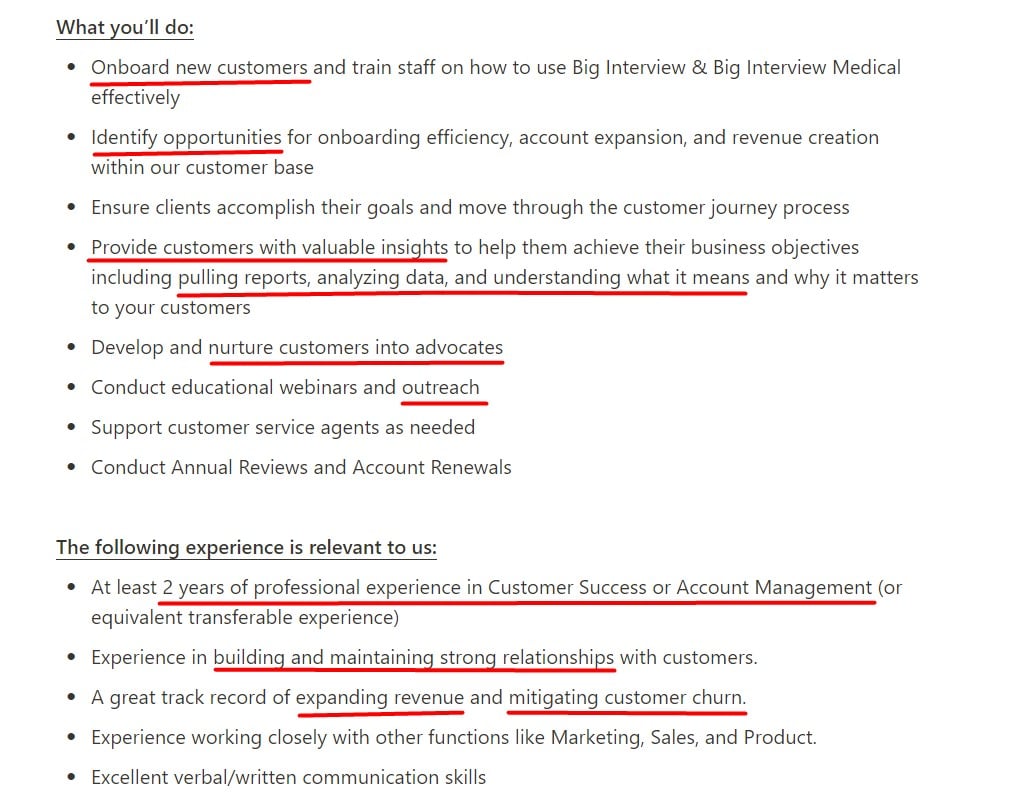
They match the skills listed for the position:
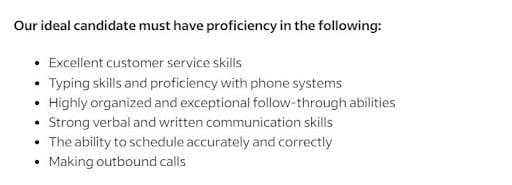
So, here are some keywords from this job ad:
- Customer service
- Highly motivated
- Ability to multitask
- Strong organizational and follow-through abilities
- Superior communication skills
- Time and task organization
Following that, you can expect questions based on examining these skills.
Here are some behavioral questions you might hear when interviewing for this position:
- Can you give an example of a time when you had to address an angry client or customer?
- Describe a time when you stayed motivated despite a challenging work situation or environment.
- Can you share an example of a situation where you had to adjust your plans due to unforeseen circumstances? How did you manage to stay organized and ensure the project’s completion?
More tips below:
✅ AI Hack:
We tested AI for predicting behavioral questions based on a job ad. It was a success – it accurately predicted the majority of the questions we asked candidates in an interview.
Here’s how you can use AI to predict what behavioral questions you might hear in an interview.
You’ll need to provide it with the job description and write a good prompt.
If you’re using a GPT proxy via API such as Chatbotui or YakGPT, you can set the “system prompt” that will be valid for all the questions you ask AI. This is also possible with the paid OpenAI ChatGPT account. Just go to Settings (when you click on the circle with your name) and click Customize ChatGPT.
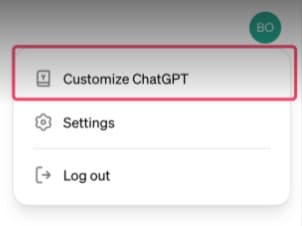
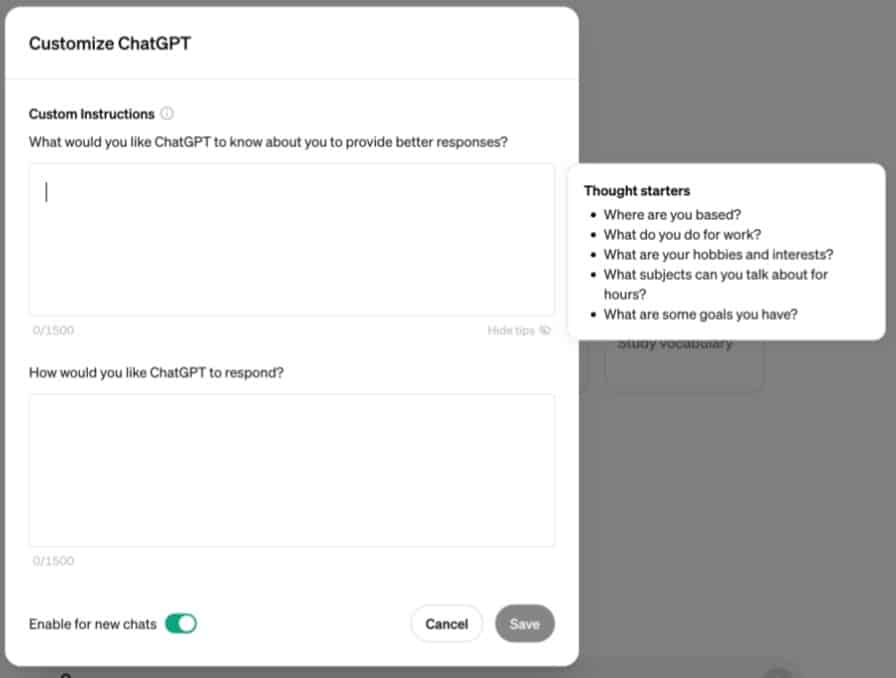
Paste this paragraph here:
If you don’t have this option, you can just type it as a pre-prompt in the text editor.
And then use the prompt:
I’m preparing for a job interview for a [job title] role. I’m expecting to be asked some behavioral interview questions. I would like to prepare for the ones most likely to be asked. Give me a list of possible behavioral interview questions based on the job description pasted below.
Here’s the job description:
[paste the job description here].
Create a list of situations
Think about the situation in question: have you ever experienced it? How did you behave and what skills did you display?
For example, for the question in the example above “Can you give an example of a time when you had to address an angry client or customer?”, you’ll need to:
- Think of a story when you had to interact with an angry customer, including details on why they were angry, what happened, how you handled the situation, and what was the result.
- Think of key skills this question is trying to assess: great communication skills, persuasiveness, patience, staying calm under pressure, empathy, problem-solving, conflict resolution, and accountability.
✅ Pro tip: When you create a list of interesting stories related to your successes, failures, and skills, you don’t have to tie them to a single interview question. In case you don’t get this exact question, the story will be useless.
Instead, make it flexible enough so that it reflects several important skills you can use for several questions.
Of course, you can’t use the same story more than once in an interview, but if you keep this in mind, you’ll have more options to choose from, and you’ll be covered for just about any scenario.
Now, let’s learn how to craft an answer using the elements we covered so far.
Use the STAR method
Great news: there’s an easy template you can use to answer behavioral questions.
It’s called the STAR method. For a detailed guide with a bunch of useful sample answers, check out this article: The STAR Interview Method: How to Answer + Examples.
STAR stands for Situation–Task–Action–Result. Following this formula will help you create informative but concise, structured, and interesting answers.
- Situation – This is the beginning of each answer, and here you have to set the context. Describe only the factors relevant to the story, and aim for this part to make up for 15% of the answer.
- Task – Here, you introduce the problem and your role in the situation, as well as how you intended to solve that problem. This part takes up 10% of the entire answer.
- Action – Here, you detail, step-by-step, exactly what you did to solve the problem. Be specific and provide details about how you did it. The “Action” part makes up for around 60% of your answer. It is by far the most important element, so pay close attention to it and display your problem-solving skills.
- Result – In this final part of your answer (15% of the entire STAR answer), outline the results of your efforts. Quantifying it will bring you bonus points, but qualitative results are fine too. You also need to include the lessons you learned from the experience. This is particularly important when answering tricky questions about conflict, failure, or weaknesses. By including the lessons learned, you’re showcasing you’re a mature individual open to feedback who learns from their experiences and is easy to work with.
More details about the STAR format here:
Deliver your answers with confidence
Practicing your STAR answer for each question 2-3 times will make you confident, as you’ll know how to form your answer and how to deliver it in an interesting way.
You can practice with your friend, in front of a mirror, or if you want objective, career coach backed advice, use our Mock Interview Simulator.
You can practice by choosing different competencies and skill groups (leadership, critical thinking, communication skills, and much more).
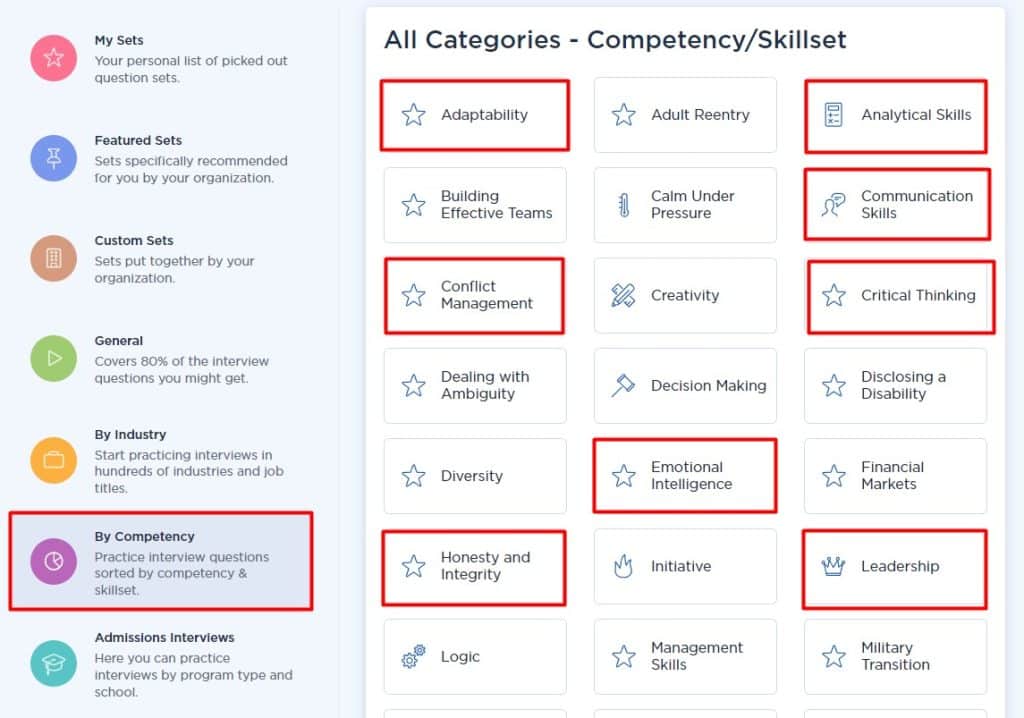
You’ll get tailored, actionable feedback to help you get better in no time:
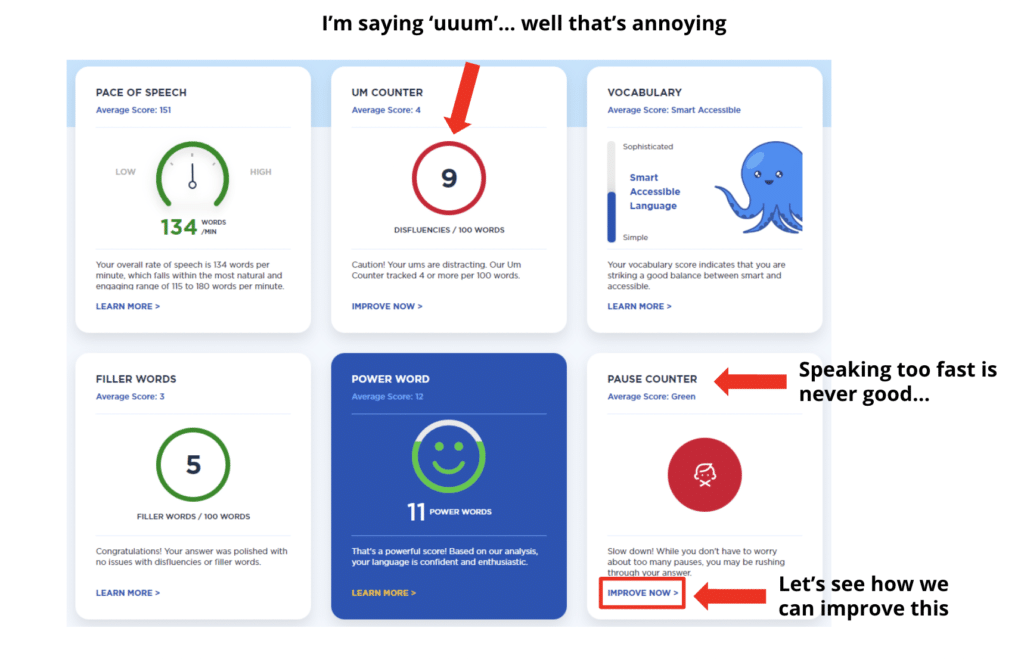
For more details on how to answer behavioral questions, check out this video:
Mistakes to avoid
Now that you know what to do to properly answer behavioral questions, here’s what to avoid.
Giving vague answers
This will be a red flag to interviewers and they’ll suspect you’re making the story up because you can’t provide details on the spot. So make sure to be honest, use real-life examples, and provide as many details as you can using the STAR method.
Coming unprepared
Interviewers will not hunt you down – you’ll reveal yourself instantly if you come to a job interview unprepared. Stuttering, avoiding eye contact, jitters, nervous leg shaking, inability to provide details, incoherent answers, all of this will hint you didn’t take the time to do your homework. To avoid this, learn how to prepare for an interview in 8 steps.
Using AI-generated responses
Using AI to create an answer and then learn it by heart is not a good idea. AI doesn’t have your unique experience, points of view, and personality. It will never be able to come up with a good enough story. You will get generic, soulless stories that interviewers have already heard a thousand times – and once your interview is over, they won’t remember you.
Using AI can be helpful to think of skills to focus your story around, but it’s best to come up with genuine responses by yourself. That’s the only way to show your authenticity and personality. Plus, if interviewers start asking additional questions, it will be difficult for you to elaborate on something AI thought of. You’ll become inconsistent with your answer and raise a bunch of red flags.
What to Do If You Never Experienced a Situation They Ask You About
Afraid you won’t know how to answer a question because you’ve never been in that situation before? Here’s what to do.
Say you’ve never been in that situation before
If you try to play it cool and think of a fake story on the spot, you’ll end up confused and your answer won’t be convincing.
That’s why you need to be honest and openly say you never had such an experience before.
This doesn’t mean you don’t have to answer that question, or make this the main focus of your answer – it’s just you making sure they understand you can’t give them a real-life situation.
After this, you can continue with your answer. Here’s how.
Give a hypothetical scenario
It’s simple: imagine you’re in the situation from the question, show that you understand the complexity of the situation, and then describe, step-by-step, how you would behave.
If you can, you can use the STAR answer. If not, it’s not the end of the world.
Just make sure you’re specific and detailed, and discuss your approach to the problem in question.
Finally, try to figure out what skill this question is trying to assess and make sure to display that skill in your answer.
Btw, there’s a separate group of questions called situational or scenario-based questions. They typically begin with “Imagine that…”, or “What would you do if…”, give you a scenario, and you have to come up with an answer.
Although they’re obviously not the same as behavioral questions, if you get a behavioral question and you never experienced a situation from it – it becomes a scenario-based question for you. Fun, huh?
Read a detailed guide on these questions and how to answer them here: Situational Interview Questions: Sample Answers & Tips.
Draw from a similar experience
In this case, you can tell them that you experienced something similar, but not quite the same.
Then, you should go on and describe how you reacted in that situation, including details and a step-by-step explanation.
Just like for the hypothetical scenario, figure out what skills they’re trying to assess and focus on that.
You can also draw parallels between that scenario and the scenario from the behavioral question, outlining similarities and discussing your behavior, or acknowledging the differences and saying how you’d react.
It’s also possible to base your answer on someone else’s story. If your friend, a coworker, or a family member had that (or similar) situation before, you can briefly describe it. Then, you can go on and explain if you agree with that approach, what you think about it, if you would do something differently and why, etc.
Summary of the Main Points
- Behavioral interview questions are the questions that begin with “Tell me about a time when…” “Can you recall a situation in which…” “Talk about a time when…” “Give an example of a time when…”
- These questions focus on your past behavior in order to predict how you’ll behave in the future.
- Each question aims to assess one or several skills important for the position – and you can roughly predict the questions you might hear based on the job description.
- Create a list of stories/situations in which you displayed a skill, achieved something, avoided something, failed, etc. It will make it easier to come up with answers.
- Use the STAR method to answer behavioral interview questions.
- Avoid being too vague in your answers, making up stories, and coming to the interview unprepared.
- If you’ve never been in a situation they asked about, be honest and openly tell them.
- Then continue by giving a hypothetical scenario, outlining how you would react or why; or you can draw from a similar experience, find parallels and differences with the situation in question, and discuss them.
_____________________________
Need a hand? There’s 3 ways we can help you:
- Learn how to answer “What are your salary expectations?”.
- Learn how to calm interview anxiety before your next interview.
- Getting invited to interviews but not landing the job? Discover actionable lessons and interview practice here (Rated with 4.9/5 by 1,000,000 users).
FAQ
What are scenario-based questions, and are they any different from behavioral questions?
Scenario-based interview questions are different from behavioral interview questions because they focus on hypothetical situations (“What would you do if…”) while behavioral questions focus on things that actually happened (“Tell me about a time when…”). For this reason, it might be easier to answer behavioral interview questions because you will base them on your actual experience, making the answer more detailed and credible.
Which behavioral questions are the most difficult to answer?
That depends on your experience, communication skills, and level of preparedness. If you get a question about a situation you’ve never been in, it might be tricky to answer. If you don’t prepare for behavioral questions in advance, it will get even harder. Additionally, candidates usually find behavioral questions about conflict, failures, and weaknesses to be difficult. But we provided useful tips for successfully answering these questions nonetheless — just scroll up.
How can I answer a behavioral question if it refers to a situation that never happened to me?
You can openly say that you’ve never been in that situation, but you’ll give a prediction on how you’d react. Then you can talk about what you would do and how you would react. Additionally, you can mention related experiences from the past that demonstrate the skills the initial question is trying to test. You can also emphasize transferable skills: for example, if you get a leadership question, but you’ve never been in a leadership position, you can talk about a time when you displayed problem-solving, decision-making, and communication skills — all of which are crucial for a leadership position.
Can I use examples from my professional career to answer behavioral questions?
Yes, you should base all your answers on your professional career. Alternatively, if you don’t have years of experience, you can use examples from your academic past or personal life, if they illustrate relevant skills that behavioral questions are trying to assess.
What if I don’t understand a behavioral question I’m being asked?
Ask for clarification — it’s much better than giving a weak, vague answer that will prove you didn’t understand the question in the first place. You can also rephrase the question to make sure you understand it, take your time to think about it, and stay calm and confident.
Do I have to use the STAR method for answering all behavioral questions? Are there alternatives?
The STAR method is the most suitable method for answering all behavioral questions, as it covers key aspects you need to talk about. Some STAR alternatives you can use are called the SOAR (Situation–Obstacle–Action–Result) approach, SAO (Situation–Action–Outcome) method, or PAR (Problem–Action–Result) framework. But if you think about it, they are very, very similar to the STAR (Situation–Task–Action–Result) method — all those techniques are based on providing context, explaining what you did, and showcasing the final result.
